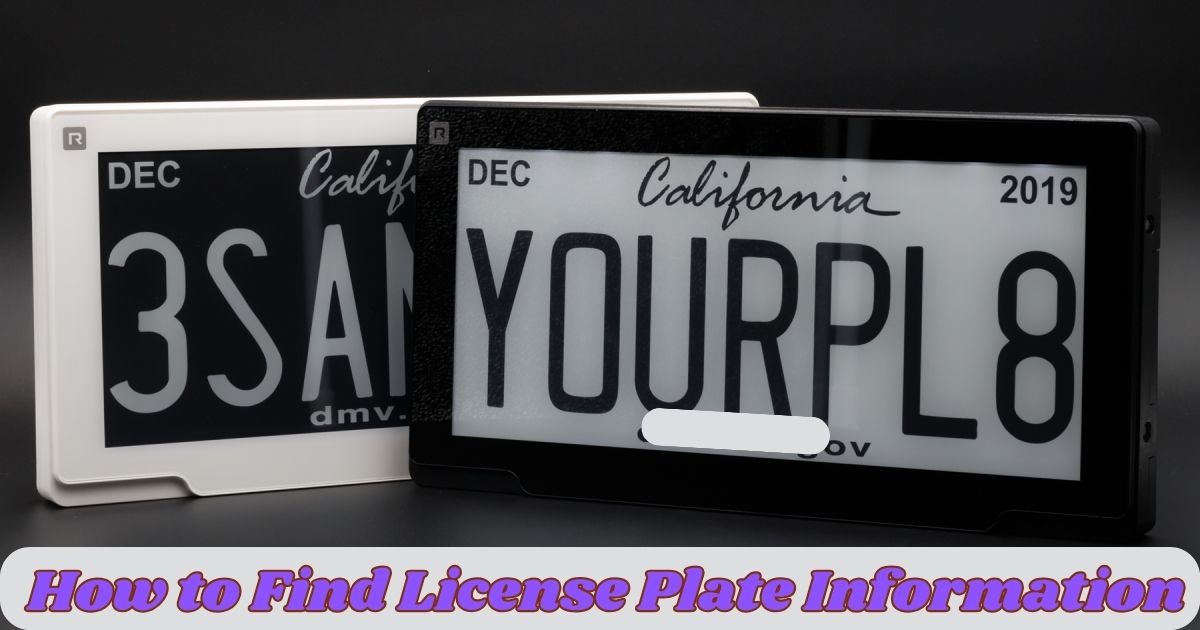Finding license plate information can be crucial for a variety of reasons, such as verifying vehicle history, investigating accidents, or tracking stolen vehicles. With the right tools, you can access important details like the vehicle’s make, model, and registration status.
However, it’s essential to understand the legal and ethical considerations when searching for license plate information. This guide will walk you through the various methods available, including online platforms, government resources, and mobile apps, while highlighting privacy concerns and potential challenges you may encounter during the lookup process.
Understanding License Plate Information
Understanding license plate information involves knowing what details can be obtained from a vehicle’s plate, such as its make, model, registration history, and sometimes the owner’s location. This data is crucial for tasks like vehicle history checks, accident investigations, or tracking stolen vehicles, depending on the jurisdiction and access laws.
What Information Can You Obtain from a License Plate?
License plates can unlock several pieces of vehicle-related data. When you run a license plate lookup, you might uncover the vehicle’s make and model, registration details, and even the owner’s general location based on jurisdiction. Depending on where you perform the search, you may also gain insights into insurance status and past traffic violations associated with the plate.
While the amount of information varies by state or country, the most common data points include the vehicle’s registration history and sometimes the owner’s name. This helps provide context for why someone might be searching for license plate information in the first place.
Why Do People Search for License Plate Information?
People look up license plates for various reasons, including investigating accidents or checking vehicle history. For example, a person may want to confirm the ownership of a vehicle involved in an accident. Others may want to research a car’s past, checking whether it has been involved in any criminal activities, has been in an accident, or is associated with a stolen vehicle.
It’s also common for individuals to seek information on a license plate before purchasing a used vehicle to ensure it hasn’t been reported stolen or involved in any fraudulent activities.
Legal Aspects of License Plate Information
The legal aspects of license plate information vary by jurisdiction. While some vehicle data is publicly accessible, its use is often restricted to prevent privacy violations. Unauthorized access to or misuse of personal information, such as for harassment or fraud, can result in significant legal consequences and penalties.
Is It Legal to Search License Plate Information?
The legality of accessing license plate information depends largely on your location. In some countries, like the United States, license plate data is considered public, but there are restrictions on how it can be used. You cannot simply access this data for personal reasons without meeting specific legal criteria.
Moreover, using personal information obtained from a plate lookup for harassment or fraudulent activities is strictly illegal. Ensure you understand the laws governing access to vehicle data in your region, as misuse can lead to significant penalties.
Privacy Concerns and License Plate Lookup
Privacy concerns are central when it comes to license plate lookups. While it’s legal to search for a vehicle’s registration details, there are ethical boundaries in place. Searching for someone’s personal data without a valid reason can be a violation of their privacy rights.
Misuse of this information, such as for stalking or spamming, can lead to criminal charges. It’s essential to be aware of the privacy laws and understand the ethical implications of conducting such searches.
Read more: Can You Look Up License Plates
Methods for Finding License Plate Information
There are several methods for finding license plate information, including using online services, government databases like the DMV, and mobile apps. Online tools offer quick results, while government resources provide more accurate details. Apps can be convenient, but they may have limited access to comprehensive data compared to official channels.
Online Services and Tools
Numerous websites and services allow you to find license plate information quickly. Some tools are free, while others require a paid subscription for detailed reports. Popular platforms like Carfax and VINCheck offer comprehensive vehicle reports, including registration status, accident history, and ownership details.
To use these tools, you typically need to enter the license plate number, and sometimes the state or country where it was issued. While some services provide basic info for free, the most detailed results usually come with a fee.
Using Government or Law Enforcement Resources
Government agencies, such as the DMV (Department of Motor Vehicles), maintain public databases with vehicle registration information. Accessing these databases often requires official permission or justification, such as being involved in a legal case.
For law enforcement purposes, the police can run checks through official channels to find more detailed information. Public records can also be accessed via local or regional police departments, although there are strict requirements for valid use of this data.
Third-party Apps and Mobile Solutions
Third-party apps and mobile solutions have made license plate lookups more accessible and convenient. Applications like Plate Recognizer and Car Info allow users to quickly scan a license plate and gather essential vehicle details through their smartphones. These apps typically provide information such as vehicle make, model, and registration status.
While they offer fast and easy searches, their database access may be more limited compared to official government databases or paid services. Users should also be aware that some apps might have restrictions on accuracy, especially for older vehicles or those registered in less common regions.
Step-by-Step Guide to Finding License Plate Information
Here some step to finding license plate information below:
Step 1: Choose the Right Lookup Method
First, decide which lookup method is right for you. If you’re looking for basic information, an online search might suffice. For more comprehensive details, such as ownership and detailed history, you may need to turn to government resources or a paid third-party service.
Step 2: Gather Information Needed for the Search
Before conducting the search, make sure you have all the necessary details at hand. Typically, you’ll need the license plate number and the state or country where it was issued. Some services also ask for vehicle identification numbers (VIN) or other vehicle-specific details.
Step 3: Enter the License Plate Information and Search
When filling out the lookup form, ensure that the license plate number is accurate. Small mistakes can lead to incorrect or no results. Make sure you’ve selected the correct state or region and avoid common mistakes like entering additional spaces or characters.
Step 4: Review the Information Provided
Once you’ve completed your search, carefully review the information provided. The report might include vehicle make, model, year, and history, such as accidents or ownership transfers. If the details are unclear or seem inaccurate, double-check the source or seek further verification from other official channels.
Alternatives to Finding License Plate Information
Alternatives to finding license plate information include contacting the vehicle owner directly if you have a legitimate reason, such as involvement in an accident. Additionally, public databases and online forums can provide insights from user-shared experiences. However, always verify the information from multiple sources to ensure accuracy.
Contacting the Vehicle Owner Directly
Contacting the vehicle owner directly can be an effective way to obtain information about a license plate, especially if you have a legitimate reason, such as being involved in an accident or verifying ownership. You can try to locate the owner through public records, social media, or direct inquiries if the vehicle is parked in a public space.
However, it’s important to approach this respectfully and within legal boundaries, as privacy laws may restrict how you can obtain contact details. Always ensure that your intentions are clear, and be prepared for the possibility that the owner may not respond or may be unavailable.
Using Public Databases or Forums
Using public databases or forums can be a helpful alternative for finding license plate information, especially when official channels are unavailable. Many online communities and websites allow users to share vehicle details, offering insights into ownership, history, or registration.
Forums dedicated to vehicle enthusiasts or specific topics like stolen vehicles or car history can be valuable for crowdsourced data. However, the accuracy of the information found in public forums can vary, so it’s important to cross-check the details from reputable sources. Always exercise caution, as relying solely on public databases may lead to outdated or incorrect data.
Potential Challenges in License Plate Lookups
When conducting license plate lookups, several challenges may arise. One of the most common issues is encountering limited information in public databases, as not all details are made available to the public due to privacy laws. Some jurisdictions restrict access to certain data, leaving only basic vehicle information accessible.
Additionally, outdated or inaccurate records can complicate searches, especially when vehicles change ownership or are involved in multiple incidents over time. Finally, legal barriers and privacy concerns may prevent individuals from accessing certain data, limiting the effectiveness of lookups and requiring alternative methods to obtain accurate information.
How to Protect Your Own License Plate Information
Protecting your own license plate information is crucial to maintaining privacy and preventing misuse. One effective step is to cover your plate when parking in public areas, especially in high-traffic locations. Consider using a license plate cover that blurs or hides your details from public view.
Additionally, be cautious when sharing photos or videos online, as they may inadvertently expose your plate number. If you’re concerned about identity theft or fraud, you can also request a new plate or report your vehicle to authorities if you suspect misuse. Being proactive helps safeguard your personal information from potential threats.
Conclusion
In conclusion, finding license plate information can be a valuable tool for various purposes, from accident investigations to vehicle history checks. However, it’s crucial to approach the process with a clear understanding of the legal and privacy considerations involved.
While there are multiple methods available, including online services, government resources, and mobile apps, challenges such as limited information and privacy restrictions can arise. To ensure responsible use, always verify data accuracy, respect privacy laws, and consider alternative methods when necessary.
FAQs
Is it legal to search license plate information?
Yes, it is legal in some areas, but there are restrictions based on privacy laws and the purpose of the search.
Can I get personal information about the vehicle owner?
No, personal details about the owner are typically protected and not disclosed in most license plate lookups.
What information can I find using a license plate lookup?
You can find details like vehicle make, model, registration history, and sometimes accident reports.
Are online license plate lookup services free?
Some are free, but more detailed reports often require payment.
What should I do if my license plate information is misused?
Report it to the authorities and take steps to secure your personal data.









